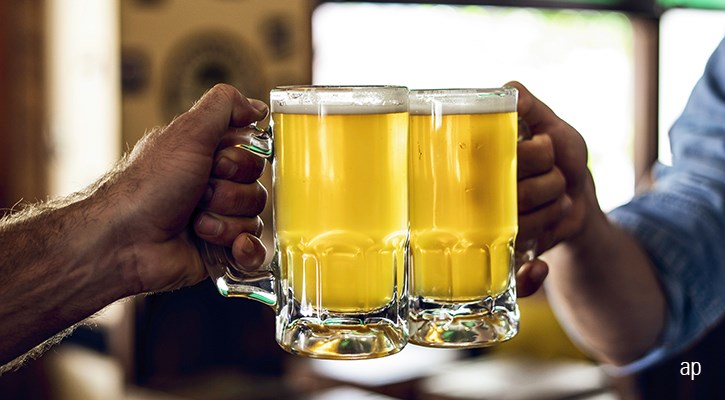
For me, the month of January always carries "first date" energy: we’re all on best behaviour, convincing ourselves and others that we can live up to our most aspirational values. We want to work out more, be more thoughtful about others and — and this is where my first date analogy fails — maybe drink less alcohol.
According to Dry January, the initiative to give up alcohol for 31 days, an estimated 7.9 million UK drinkers are going teetotal this month. Beyond the initiative, younger people are increasingly ditching booze altogether anyway, with various estimates suggesting about a quarter of 16-24-year-olds no longer drink in earnest.
Whether you yourself are teetotalling it through the first month of 2022 or not, the role of alcohol in your portfolio is worth examining.
From a cultural perspective, so-called "sin stocks" have received more scrutiny as ESG investing has increased in popularity, but it has also particularly been the case given consumer behavioural changes during the pandemic, where public health was literally a grave concern, and people were forced to grapple not just with their own loneliness, but the question of how to socialise remotely.
Is Booze ESG-Friendly?
Companies involved in alcohol production are considered "sin stocks" together with tobacco and gambling companies. Depending on your viewpoint, you might think the alcohol industry to be a largely unethical one. Indeed, some funds already impose exclusions on such companies, alongside more traditional carbon emitters and weapons manufacturers. That said, we are perhaps not quite at the point where alcohol stocks are seen as "sinful" in the popular consciousness. So what makes booze better than its supposedly-more-sinful peers?
Morningstar company Sustainalytics produces comprehensive ESG ratings, and its analysts have an amazing array of insights into ESG issues. It says alcoholic beverages are considered controversial because excessive drinking can lead to social problems like addiction and public health issues. Certain religions also outlaw intoxicants, making them unsuitable investments for people of faith.
On the public health front, alcohol is a causal factor in more than 200 kinds of diseases and injuries, from physical to mental, according to the World Health Organisation. But it can also lead to somewhat subtler socioeconomic problems. Drinking too much can lead to being judged negatively by other people, while its impact on productivity and household earnings (not to mention relationships) can be wholly destructive. A person vulnerable to alcohol addiction can go very quickly from participating in mainstream society, to losing everything. You are more likely to be an alcoholic than a heroin addict, such is its availability.
Parking the societal and microeconomic impact of booze for a second, it is also a huge issue environmentally. Water stress is a vital ESG issue here, and alcohol companies contribute to it. As Morningstar analyst Kate Matrosova recently discussed, there are no alternatives to fresh water, unlike fossil fuels; as a result, our reliance on water poses not only critical challenges to the health of ecosystems but also to the operations of businesses, communities, and society.
This is a problem because water is a primary ingredient in alcoholic drinks. In 2011, the drinks giant Diageo (DGE) used on average 6.9 litres of water per litre of finished product.
Having said all that, alcohol remains the sin stock category people seem least worried about. A Robeco study of pension funds in the Nordics — the region that’s arguably the toughest on imposing exclusions — found that only tobacco stocks are shunned on a large scale, while alcohol and gambling are not. Even the Church of England doesn’t have an outright ban on it, and can invest in alcohol on a discretionary basis. Given its increasingly-progressive statements about the migrant crisis, that might seem a contradiction.
A Blunt Weapon
So what is the case for alcohol? Swetha Ramachandran, investment manager at GAM Investments, says a blanket policy of no investment in alcohol companies can be a blunt instrument when it comes to achieving ESG objectives.
“It is widely accepted that it is excessive and irresponsible consumption of alcohol that is problematic, not consumption in moderation — and it is the latter practised by the overwhelming majority of drinkers worldwide," she says.
Large (and listed) alcohol companies are also the most proactive in emphasising the importance of responsible drinking. However, as much of a paradox that may sound, the message does reach consumers globally via advertising and product labelling, which is quick to remind drinkers not to imbibe excessively, and not to imbibe at all when pregnant.
Furthermore, in a bid to capture the hearts (and healthy livers) of younger consumer groups, companies are adding alcohol-free products to their product ranges almost faster than supermarket shelf stackers can do their magic. For example, Diageo launched an alcohol-free Gordon’s gin in time for Dry January last year, and AB InBev (ABI) boasts over 80 different low-or-no-alcohol beers in its catalogue.
According to alcohol analysts ISWR, volume sales of non-alcoholic spirits grew by 169.7% between 2017 and 2019. Socially, companies like Brewdog have also sought to entice men who want to take on a much fairer share of childcare responsibilities in their homes. With alcohol-free beer, you can have a drink and still look after the kids responsibly.
Another case for owning some of the premium alcohol companies is that in emerging markets, premium alcoholic drinks like whisky are a status symbol. As such, drinkers are willing to pay more for premium brands.
That “premiumisation” strategy is one of the key themes for fund manager Nick Train, who holds Diageo in Silver-rated Finsbury Growth & Income Trust (FGT). Among the companies rated by Morningstar, Diageo is also in a very distinctive list of FTSE 100 stocks that have increased their dividend every year for more than 20 years. Looking back over the past decade, 2011 saw the drinks giant pay 40p per share. By 2020 that had risen to 70p, an increase of 75%.
“Diageo is the best collection of alcoholic beverage brands in one company that exists anywhere in the world. We're lucky that it's a UK company,” Train told Morningstar.co.uk in 2020. We hope to catch up with him about this in the next couple of weeks, so watch this space.
Ramachandran agrees, meanwhile: “in emerging countries particularly, branded alcohol can be safer than illicit liquor, in addition to being an important tax contributor. Divestment from alcohol companies also precludes engagement, neglecting an important channel to modify and influence corporate policy and behaviour on topical issues such as water intensity and regenerative sourcing.”
Among Morningstar’s rated booze stocks, 10 even have a wide economic moat rating. Pernod Richard and Diageo are the companies with the lowest ESG risk rating. Chinese Kweichow Moutai (600519) has the highest ESG risk, and the second-best three-year annualised return of the stocks, with 42.57%, behind Wuliangye Yibin (000858), which has grown 60.60% year-on-year for three years.



























